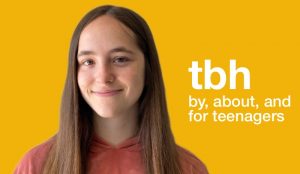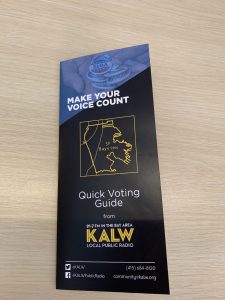ACE Spectrum
ACE Spectrum
Ace Spectrum is about you — the ACE Learning Centers.
It’s a quick sharing of ideas, inspiration, opinions and best practices among our continuing education organizations.
Please join the conversation.
Teen-Made Podcast tbh Focuses on Issues Teens Want Adults to Pay Attention to Before They Vote
By Ben Trefny, News Director, KALW, Audience Supported Public Media
I’ve got a really important post to share before Election Day.
KALW‘s podcast tbh — made by, for, and about teenagers — just wrapped up its second season. It’s the result of our journalists/teachers’ work with more than 100 SFUSD high school students and seven teens from around the Bay Area who took part in our summer high school podcasting institute.
This season was focused on issues that young people want adults to pay attention to as the election approaches. It’s timely and topical, and a valuable look into teenage minds in 2020 — a year of pandemics, protests, and divisive politics. Check out the episodes we helped produce:
Ep 1: Learning About Sexual Assault And Healthy Relationships — reported by Kennedy High School in Fremont graduate Zara Ahmed (’20)
Ep 2: Are You A Gamer? It Depends On Who You Ask — reported by Presentation High School in San Jose graduate Hannah Ni (’20)
Ep 3: The Tangled Web Of Cancel Culture And Activism — reported by Carlmont High School in Belmont senior Ava Richards (’21)
Ep 4: Wheelchair Basketball Is Just Basketball — reported by Ruth Asawa School of the Arts in San Francisco sophomore Avery Dauer (’23)
Ep 5: Reflecting On Segregation At One Of The Most Diverse Schools In America — reported by Oakland Technical High School senior Chosang Tenzin (’21)
Ep 6: Schools Should Support Students — Not Criminalize Them — reported by Gateway High School graduate Masiyah Edwards (’20)
Ep 7: Why Basketball Players Shouldn’t Just ‘Shut Up And Dribble’ — reported by Sacred Heart High School in San Francisco graduate Maddie Johnson (’20)
Every episode also includes several commentaries from teenagers about issues ranging from harassment and bullying, to racial discrimination and equity, to privilege and poverty, to health care, immigration, and climate change.
I have never been more proud of a program the KALW news department has produced. For these students to come together and work so hard — through video conferencing and distance learning, no less — in such tumultuous times is a huge triumph. And the work is testament to how deeply they care and think about working hard and communicating their truths.
Also, I want to give an absolutely heartfelt shoutout to their lead teacher, organizer, and editor, Holly J. McDede, and their assistant teacher and editor, Sarah Lai Stirland (Audio Academy class of ’20), who went so far above and beyond what was asked of them, giving so selflessly of their time and energy to help these students be successful. I’m forever grateful.
Please be sure to give a listen to tbh. And, as these students have asked you to do throughout this entire season, be sure to share your own voice and vote.
KALW: Neither Snow Nor Rain Nor Heat Nor Gloom of Night Stays These Journalists from the Swift Completion of Their Appointed Rounds
By Ben Trefny, News Director, KALW, Audience Supported Public Media
I derived that header from George Herbert Palmer‘s translation of Herodotus‘ Histories. It applies well to the postal service (which uses a version as an unofficial motto) as well as to KALW‘s trainees and professional journalists. We’ve all got obstacles to overcome to do our work these days, but it’s as important as ever that we do a good job and come through when we’re needed.
As we come within a week of Election Day, 2020, KALW has been conducting some unprecedented election coverage and outreach, led by members of our Audio Academy. I’d like to give you an update!
Election Briefs
When we surveyed our audience before the last presidential election, we overwhelmingly heard they wanted — actually needed — simple and clear explanations of the many, many, many propositions and measures on their ballots. We responded with our bingeable Election Briefs: two minute, non-partisan, informational and fun digests of state and local ballot measures.
This year, we doubled down — pretty literally. By Election Day, we will have produced about 50, including all 12 state propositions, all 13 in San Francisco, a tri-county ballot measure about CalTrain, and every county-wide ballot measure in the rest of the Bay Area’s eight counties. We also chose many of the city measures, with a focus on those affecting low voter turnout areas.
We got started producing this work back in July, and we’ll be working on them right up through the end of the week. They’ve been primarily reported on by our summer trainees and continuing Audio Academy grads at first, and then by the Audio Academy class of 2021. They’ve been a great training tool: quick, personable, well-researched, fact-based pieces, and they really got this class going swiftly.
Additionally, we translated our Election Briefs on all 12 California propositions into Spanish. And we developed partnerships with the bilingual newspaper El Tecolote, as well as The Oaklandside and NPR’s California Hub to distribute them all.
If you are looking for some help getting straightforward information to help you with your vote, look and listen no further. Here’s the link to our Election Briefs.
Low Voter Turnout Engagement
After establishing the baseline goal of providing our audience with voluminous information about propositions and ballot measures, we established another goal for our elections coverage: we would focus on helping to inform people in the Bay Area’s lowest voter turnout precincts. We studied precinct returns from the 2016 election and discovered, percentage-wise, where registered voters turned out the least in the Bay Area. These include part of Fairfield in Solano County, Richmond’s Iron Triangle in Contra Costa County, part of West Oakland in Alameda County, parts of Bayview in San Francisco County, and parts of East Palo Alto in San Mateo County.
With this information, we created door hangers discussing KALW’s work and mission in English on one side and Spanish on the other, inviting recipients to connect with us with their questions regarding the election and their community. I was joined in distributing the 5,000 pieces by several volunteers, including Audio Academy graduates Angela Johnston (’14), Precious Green (’20), and Sarah Lai Stirland (’20). It was great to go into the neighborhoods and talk with people, introducing ourselves as public interest journalists who want to get the stories that matter most to them right. Our coverage since then has been shaped, in part, by the questions we’ve been receiving from people in these neighborhoods, including about issues of homelessness, illegal dumping, school board elections, and specifics on propositions and ballot measures.
We followed up by creating voter guides, designed by Chris Egusa (’20), specific to each of the seven precincts where we were focusing our attention. Each one includes info about where and how to vote in their precinct (even if they need to register in person on Election Day), information about where to find KALW’s comprehensive elections coverage about each county including a QR code linking to our website, and capsules about each state proposition including information about who the biggest funders for and against each measure are and how much they spent. We enlisted the help of many volunteers again, including Scott Carroll (’21) and Azul Dahlstrom-Eckman (’21) along with several listeners who contacted us, to distribute 6,000 voter guides door to door.
Community and Media Partnerships
Another new element we added this year was assigning all eight new Audio Academy fellows specific regions to research and develop relationships within. With our focus on low voter turnout precincts, we made teams of two for Fairfield, Richmond, Bayview, and East Palo Alto (with Sarah Lai Stirland taking on West Oakland as a post-graduate assignment), and they each wrote up beat memos, identifying leading community organizations. Our elections coverage manager, Sonia Narang, connected with many of these groups, and in the weeks leading up to Election Day, we’ve been taking part in group meetings all over the Bay Area to discuss voting issues and answer questions helpful for local residents.
Groups we’ve spoken with, or will speak with, include:
NIAD – Nurturing Independence through Artistic Development – in Richmond
RYSE Youth Center – 18 and Voting – in Richmond
The Fillmore Merchants and Neighborhood Collaborative for a Black voter information session – in San Francisco … (and you can click the link to see the video Sonia took part in around 1:50)
Commission on Aging – in Oakland
Nuestra Casa – in East Palo Alto
Finally, we established partnerships with other media organizations who specifically serve these low voter turnout communities, including El Tecolote, The Oaklandside, Richmond Confidential, Hoodline, and San Francisco Bay View. We conducted interviews with many of their reporters for air on Crosscurrents, and will connect with them again on Election Night as well as after the election as we consider the results.
The Results
We’re all curious, aren’t we?! This has been a highly charged election, after four (or many more, really) turbulent years. Now we’re down to just days to find out how things turn out. KALW will be live on the air Election Night, sharing the mic with reporters from NPR and around the Bay Area, from 4pm until 11pm. Tune in and see how things turn out.
It’s About Community at OIHS’s Parent ESL Classes, and Learning How to Use Zoom
By Martha Sessums, President, ACE
A big part of distance learning in 2020 is mastering Zoom, the team video communications app used by most schools and many businesses in this new age of work and learn from home. Or at least becoming sufficient enough with computer technology and the app so that one can attend and participate in classes.
It’s also about community, and Oakland International High School’s (OIHS) Parent English as a Second Language (ESL) Classes embrace that. Community because the ESL classes, part of the ACE Learning Center at OIHS, are open to all in the Oakland community, not just parents of students attending the high school. Community because the Learning Center classes are in partnership with Refugee and Immigrant Transitions (RIT) that provides services to refugees and immigrants in the Bay Area. Community because the classes support the many languages spoken by the adult students. Community because the staff works hard to meet the challenges of providing ESL classes to parents with jobs and/or with children who are also learning online, have babysitting needs or have no or little access to the technology needed to attend online classes.
Mostly community because the teacher and the students of these Parent ESL classes become friends and supporters of each other, working hard to make the class be a success for each person and a safe place.
Last March when shelter in place started it was hard to get parent students the needed computers and internet access, but the school got it done. Then students had to download and install Zoom and learn how to use it, so there were bilingual tech support calls until Zoom became the norm.
“It was impressive to see parents in classes dealing with brand new, unchartered territory,” said Sonia Wong, Education Manager at RIT. “But they showed up and got online to learn English. It was a real sense of community.”
There are two levels of classes in the Parent ESL program, both taught by Cara Lazarus, RIT Adult English Language Instructor. Class 1 focuses on English for where parents need to use it most – work, their children’s school experiences, health care, etc. What does one say when calling school to say your child will be absent or discuss and understand issues at parent/teacher conferences? How does one ask key questions at work and comprehend the answers? Understand the air quality index and instructions for wearing a mask and social distancing? What are the symptoms of Covid-19 and what to do about them? How to manage job applications, the DMV and what to do if one is pulled over by police while driving. Even basics like who to contact and the vocabulary needed if the phone dies.
Class 2 is for parents that know zero English. The focus is on words and phrases, key letters and listening for words and speaking. Their goal is to learn enough English to move up to Class 1.
There are challenges for these classes such as holding the class at a time that works for working parents or to accommodate parents who provide childcare. But the successes are huge.
“Online classes have a silver lining,” said Wong. “There is no transport barrier to come to OIHS for the classes, no childcare barrier and less of a work schedule barrier so we have gotten more parents attending. We average 10 students per class, which is great.”
Plus, the parent students are working hard to succeed and are open about what they want or need.
“Not only are the students and teacher classmates, but they are friends,” said Wong.
Stay tuned for stories from some of the parents attending OIHS’s Learning Center Parent ESL Classes in future ACE Spectrum blogs.








